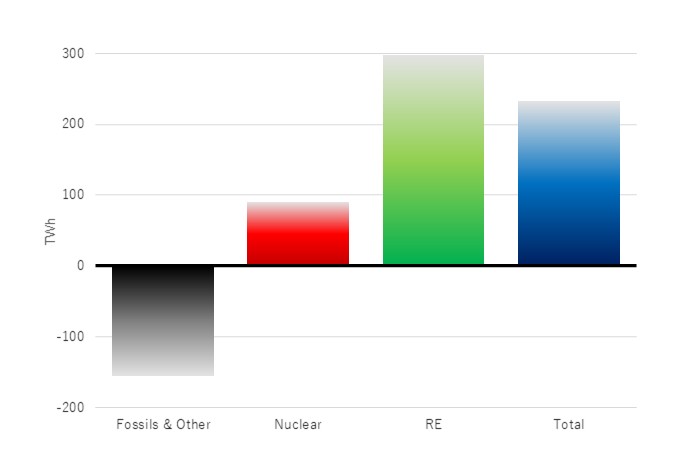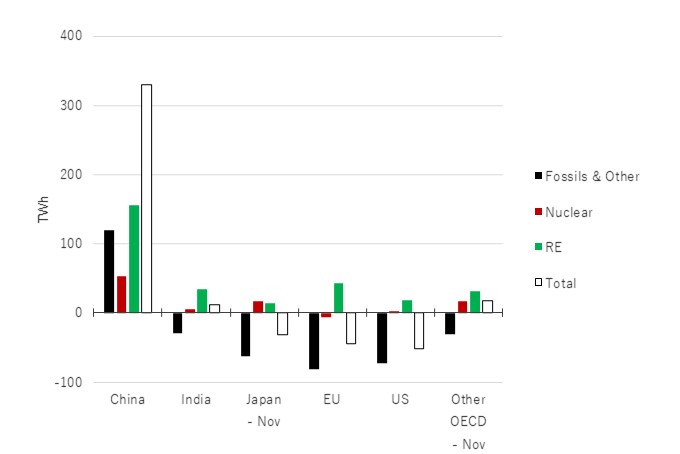Fossil fuel based electricity also increased when total generation increased, resulting in more greenhouse gases from electricity generation globally. Renewable energy contributed, but so far not enough to make up the total increase. But now it is clear that 2019 marks a turning point. Renewable energy increased more than demand, and fossil electric power decreased despite global consumption increasing.
A compilation of data from countries accounting for about 75% of the world’s total electricity generation, including China, the United States (US), the European Union (EU), India, Japan, and the rest of the OECD countries not aforementioned, indeed shows that RE YoY growth surpassed total electricity generation YoY growth; almost 300 terawatt-hours (TWh) and about 230 TWh, respectively:
World* Change in Electricity Generation 2019-2018

Note: data up to December, except for OECD countries – excluding the US and the EU, which are up to November.
Sources: aggregated by REI based on Agora Energiewende/Sandbag, China Electricity Council, Central Electricity Authority, U.S. Energy Information Administration, and International Energy Agency.
This remarkable achievement is the result on the one hand of continuous strong growth in cost-competitive RE (primarily hydro, solar, and wind) with positive developments observed everywhere, on the other hand of moderate growth in total electricity generation essentially driven by China:
Countries Change in Electricity Generation 2019-2018

Sources: China Electricity Council (China), Central Electricity Authority (India), Agora Energiewende/Sandbag (EU), U.S. Energy Information Administration (US), and International Energy Agency (Japan and other OECD).
Nuclear generation also increased globally despite 13 reactors closing and only 6 new opening.2 Mainly due to resumed operation of old reactors in Japan that have been idle since the 2011 Fukushima reactor core melts. Renewable growth was the major part, around three-quarters, of the non fossil growth.
However, the nuclear industry will probably not repeat its 2019-2018 success this year due to the facts that it has known limited progress in 2019 with reactor permanent closures exceeding new starts both in terms of number of reactors and installed capacity, and that it faces mixed expectations for 2020 as for examples permanent shutdowns in France and the US, and temporary shutdowns in Japan due to delays in anti-terrorism measures implementation, which will counterbalance to some extent the contribution of additions in the coming months.
The increase in electricity generation from low cost, low carbon renewable technologies made a victim; fossil energy. With the exception of China, electricity generation from fossil fuels fell everywhere, decreasing by more than 150 TWh YoY. Reductions were spectacular in the EU, the US, and Japan. Though comparatively lower, the reduction in India was more important as many have predicted India to be a country that would become a major threat to global climate protection efforts.
That people who have invested in coal energy despite knowing the global climate risks they created now lose money in bankruptcies may inspire moral behavior in the finance sector. However, an important political task is to protect the individuals who lose their income as the companies they have worked for collapse.
- 1BP, Statistical Review of World Energy 2019 (2019).
- 2International Atomic Energy Agency, Power Reactor Information System (accessed February 27, 2020).






